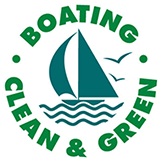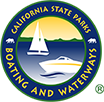
California has one of the highest levels of recreational boating activity in the nation. With over three million recreational boats in California, every effort to follow the actions below is a significant step towards preserving the waterways in our beautiful state.
Español:
10 Recomendaciones para Pasearte en Bote Protegiendo al Ambiente [PDF]

1. Prevent oily discharge from the bilge.
Keep the bilge clean and dry and your boat engine well tuned to prevent fuel and oil leaks. Place an oil absorbent under the engine and in the bilge. Check the absorbents often and dispose of them as hazardous waste at a marina or nearby collection center. Report oil and chemical spills by calling both (800) OILS911 and (800) 424-8802.
2. Spill-proof your oil changes and fueling.
If you change your boat engine oil, be sure to use a closed system (such as a portable oil-change pump) available at marine supplies stores and always have an oil absorbent handy. Drain the used oil into a container that can be closed to prevent spills. Fuel up your tank slowly and use absorbents to catch spills. Do not top-off or overflow your fuel tank, and leave 10% of your tank empty to allow fuel to expand as it warms. Dispose of saturated absorbents and fuel bibs at a hazardous household waste facility. Recycle your used oil and oil filters.
3. Do not add soap.
Never use soap to disperse fuel and oil spills. It is harmful to the environment, and it is illegal. Avoid using bilge cleaners as they may get discharged overboard.
4. Minimize boat cleaning and maintenance in the water.
Save maintenance projects for the boatyard. Avoid projects that involve working on the docks or working over the water. When performing work on the water, minimize your impact by containing waste using tarps and vacuum sanders, and collect all drips and debris for proper disposal. Use cleaners that are water-based, biodegradable, phosphate-free and labeled as less toxic. Avoid products with ingredients known to cause cancer or reproductive harm as listed in California’s Proposition 65. Check out these less toxic cleaning alternatives for all types of uses.
5. Reduce toxic discharges from bottom paints.
Consider using non-copper antifouling coatings. Minimize fouling growth and extend the life of your hull coating by giving the bottom a thorough wipe with a soft, non-abrasive sponge. Use hull cleaning companies who use green management practices such as monitoring their divers and using non-abrasive scrubbing agents. If your boat isn’t used frequently, consider keeping it in dry storage or installing a floating hoist in the slip to minimize fouling marine growth. For more information visit ucanr.org/sites/coast/
6. Dispose of hazardous waste properly.
Dispose of paints, batteries, antifreeze, cleaning products, oil, oil filters, and other hazardous wastes at a hazardous waste collection facility or event. Learn more here.
7. Plan ahead! Manage sewage wastes properly.
It is illegal to discharge untreated sewage anywhere within the three-mile territorial limit including lakes, rivers, reservoirs or coastal waters. Never discharge treated sewage into “restricted waters” such as a marina, swimming/wading areas, a sanctuary, poorly flushed areas, lakes, reservoirs, or freshwater impoundments and into a federal No Discharge Zones. Use sewage pumpouts, dump stations, or mobile-pumpout services. For locations click here.
8. Stow it, do not throw it!
Keep your trash on-board. Never throw cigarette butts, fishing line, or any other garbage into our waterways. Take advantage of shore-side facilities to recycle plastic, glass, metal, and paper. Avoid excess packaging.
9. Reduce grey water discharges.
Use a phosphate-free soap to minimize the impacts of grey water on the marine environment. Also, minimize discharge by doing dishes and showers on-shore whenever possible.
10. Do not spread aquatic invasive species. Clean, drain, and dry your boat.
Before leaving any body of water, examine your boat and equipment and remove any visible mud, plants, or animals before transporting equipment. Never release plants or animals into a body of water unless they came out of that body of water. Also, do not release them into storm drains, because most storm drains lead to water bodies or wetlands. Eliminate water from all equipment before transporting anywhere. Clean and dry anything that came in contact with the water (boats, trailers, equipment, dogs, boots, clothing, etc.). For cleaning procedures visit Stop Aquatic Hitchhikes. For specific information about Quagga and Zebra Mussels and how to inspect and clean your boat, visit the Department of Fish and Wildlife or call 866-440-9530.
